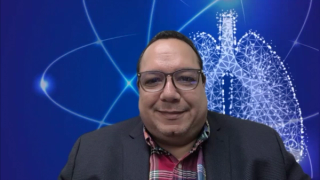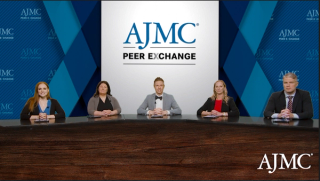
Non-Small Cell Lung Cancer
Latest News

Latest Videos

CME Content
More News

A new drug application (NDA) has been submitted to the FDA for sunvozertinib in pretreated EGFR exon 20–positive advanced non–small cell lung cancer (NSCLC).

Principal treatment-related toxicities that come from amivantamab administration include skin-related reactions, higher risk of venous thrombolism, and infusion-related reactions.

More than 80% of patients with lung cancer receive care in their communities, but this can leave them vulnerable to gaps in care quality and delivery.

Amivantamab's role in non–small cell lung cancer (NSCLC) has been a highlight of the lung cancer space this year, with the 2 most recent approvals based on data from the MARIPOSA and MARIPOSA-2 trials.

The current research focus for Umit Tapan, MD, Boston Medical Center, is reducing disparities in lung cancer care and improving treatment access, in particular for immunotherapy and targeted treatments.

Optune Lua creates tumor-treating fields to disrupt cancer cell division, and it is used in conjunction with PD-1/PD-L1 inhibitors or docetaxel to treat metastatic non–small cell lung cancer (NSCLC) that has not responded to platinum-based treatment.
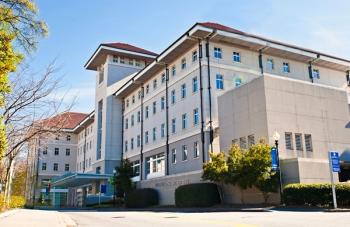

Ticiana Leal, MD, Winship Cancer Institutes, explains the importance of biomarker testing and multidisciplinary conversations while caring for patients with early-stage non–small cell lung cancer (NSCLC).

Study results show that a portable breath analysis device designed for early detection of non–small cell lung cancer may distinguish between patients with the disease and healthy individuals.

The approval came days before the FDA’s expected deadline and makes this the only PD-1 inhibitor approved for resectable non–small cell lung cancer (NSCLC) in the neoadjuvant and adjuvant settings.

In less than a month, from August 20 to September 19, amivantamab (Ami; Rybrevant, Johnson & Johnson) received 2 approvals from the FDA for use in non–small cell lung cancer (NSCLC).

On September 19, the FDA handed down its third amivantamab (Rybrevant; Johnson & Johnson) approval for 2024 in non–small cell lung cancer (NSCLC), giving the third-generation tyrosine kinase inhibitor its fourth approval overall.

The approval means an additional indication for osimertinib (Tagrisso; AstraZeneca) for adult patients who have unresectable stage III non–small cell lung cancer (NSCLC) with EGFR mutation.

The FDA approval of amivantamab-vmjw (Rybrevant) in combination with chemotherapy is the first targeted treatment to cut disease progression risk for EGFR-positive non–small cell lung cancer (NSCLC).

Here we conclude our discussion with David P. Carbone, MD, PhD, The Ohio State University, by addressing the importance of both advocacy for and education on biomarker testing in the lung cancer space.

Developers anticipate releasing full efficacy results from the phase 2 THIO-101 trial later this year.
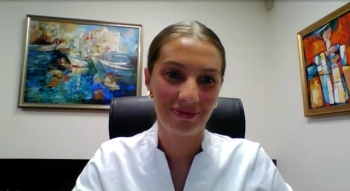
Ana Baramidze, MD, PhD, Todua Clinic, Tbilisi, Georgia, details exciting findings from the EMPOWER-Lung 1 trial regarding cemiplimab and patients with non–small cell lung cancer (NSCLC).

Ticiana Leal, MD, associate professor and director of the Thoracic Medical Oncology Program in the Department of Hematology and Medical Oncology at Emory University School of Medicine, discusses the latest advances in perioperative non–small cell lung cancer (NSCLC) treatment.

This newest approval for amivantamab is the second approval in 6 months for the EGFR and MET bispecific antibody.
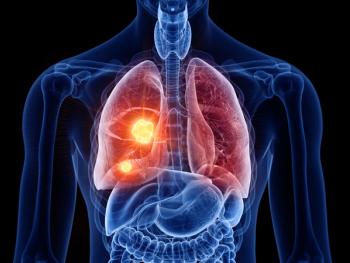
Measures of systemic inflammation used for the liver, including C-reactive protein-albumin ratio and modified Glasgow prognostic score, demonstrated prognostic value in non–small cell lung cancer (NSCLC).

In part 1 of our interview with David P. Carbone, MD, PhD, The Ohio State University, he addressed why it is important to conduct biomarker testing in both lung cancer overall and non–small cell lung cancer more specifically.

Patients with non-small cell lung cancer (NSCLC) can use lazertinib in combination with amivantamab as a first-line treatment.

The panel provides insights on enhancing outcomes for patients with metastatic non-small cell lung cancer without targetable driver mutations.

This investigation was conducted among older, frail patients, a population typically underrepresented in clinical trials.

The panel shares clinical practices for overcoming immunotherapy resistance in patients with non-small cell lung cancer.





